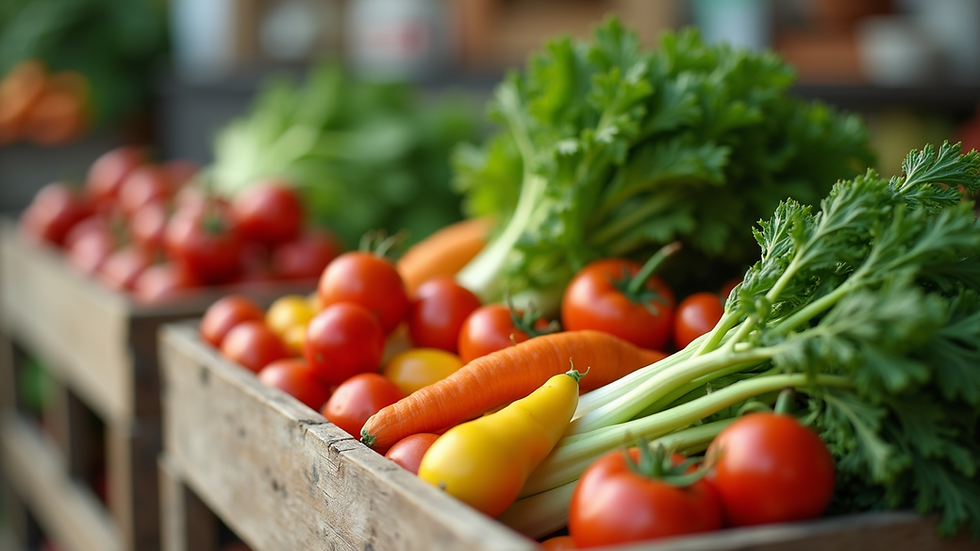Benefits of Choosing Organic Vegetables for Health
- SAI PRANAY BOJJA
- Nov 11, 2025
- 4 min read
Eating vegetables is a key part of a healthy diet, but not all vegetables are created equal. Choosing organic vegetables can offer several health benefits that go beyond basic nutrition. This post explores why organic vegetables deserve a place on your plate and how they can support your well-being.

What Makes Vegetables Organic?
Organic vegetables are grown without synthetic pesticides, herbicides, or chemical fertilizers. Farmers use natural methods like crop rotation, composting, and biological pest control to maintain soil health and protect crops. This approach avoids harmful chemicals that can remain on produce and enter the human body.
Organic certification requires strict standards to ensure food safety and environmental sustainability. This means organic vegetables are produced with care for the ecosystem and consumer health.
Higher Nutrient Content in Organic Vegetables
Research shows organic vegetables often contain higher levels of certain nutrients compared to conventionally grown ones. For example:
Antioxidants: Organic produce tends to have more antioxidants such as flavonoids and vitamin C. These compounds help protect cells from damage caused by free radicals.
Vitamins and minerals: Some studies find increased levels of iron, magnesium, and phosphorus in organic vegetables.
Phytochemicals: These natural plant chemicals support immune function and reduce inflammation.
Eating vegetables rich in these nutrients can improve your body's defense against chronic diseases like heart disease and cancer.
Reduced Exposure to Harmful Chemicals
One of the biggest health advantages of organic vegetables is the lower risk of pesticide exposure. Conventional farming often uses chemical pesticides that can linger on produce even after washing. These chemicals have been linked to health problems such as:
Hormone disruption
Neurological issues
Increased cancer risk
Choosing organic vegetables reduces your intake of these substances. This is especially important for children, pregnant women, and people with weakened immune systems who are more vulnerable to chemical effects.
Better Taste and Freshness
Many people notice that organic vegetables taste fresher and more flavorful. This can be due to:
Natural growing methods that allow vegetables to mature fully
Avoidance of preservatives and artificial ripening agents
Shorter time from farm to table in local organic markets
Enjoying tastier vegetables encourages healthier eating habits and greater vegetable consumption overall.
Environmental Benefits That Support Health
Organic farming protects the environment by avoiding synthetic chemicals that pollute soil and water. Healthy ecosystems contribute to cleaner air and water, which directly affect human health. Benefits include:
Improved soil fertility and biodiversity
Reduced chemical runoff into waterways
Lower greenhouse gas emissions
Supporting organic agriculture helps create a healthier planet, which in turn supports healthier communities.
Organic Vegetables and Food Safety
Organic standards also emphasize food safety. For example, organic farmers avoid genetically modified organisms (GMOs) and use natural fertilizers like composted manure. This reduces the risk of contamination with harmful bacteria or chemical residues.
While no food is completely risk-free, organic vegetables offer an added layer of safety through strict production guidelines.
Practical Tips for Choosing and Using Organic Vegetables
If you want to include more organic vegetables in your diet, here are some helpful tips:
Start with the “Dirty Dozen”: These are vegetables and fruits known to have higher pesticide residues when conventionally grown. Buying organic versions of these can reduce chemical intake.
Shop local farmers markets: Many small-scale farmers use organic or low-chemical methods even if not certified. Ask about their practices.
Grow your own: If possible, grow vegetables at home using organic methods. This ensures freshness and control over what goes into your food.
Wash all produce: Even organic vegetables should be rinsed to remove dirt and bacteria.
Plan meals around seasonal organic vegetables: This supports local agriculture and ensures peak nutrient content.
Addressing Common Concerns About Organic Vegetables
Some people hesitate to buy organic due to cost or availability. Here are some points to consider:
Cost: Organic vegetables can be more expensive, but buying in season and local can lower prices. Prioritize organic for the most pesticide-prone vegetables.
Availability: Many supermarkets now carry organic options. Community-supported agriculture (CSA) programs also provide fresh organic produce.
Shelf life: Organic vegetables may spoil faster due to lack of preservatives. Plan meals accordingly and store properly.
The health benefits and environmental impact often outweigh these challenges.
How Organic Vegetables Fit Into a Healthy Lifestyle
Choosing organic vegetables is one part of a balanced diet and healthy lifestyle. Combine them with whole grains, lean proteins, and regular physical activity for best results. Remember, eating plenty of vegetables—organic or not—is crucial for health.
Organic vegetables add value by reducing chemical exposure and boosting nutrient intake, making your diet cleaner and more nourishing.
Choosing organic vegetables supports your health in multiple ways. From higher nutrient levels to fewer harmful chemicals, organic produce offers a safer and more wholesome option. By making informed choices and incorporating organic vegetables into your meals, you invest in your well-being and the health of the environment.
Start exploring organic options today and enjoy the fresh taste and peace of mind that comes with eating food grown naturally. Your body and the planet will thank you.


Comments